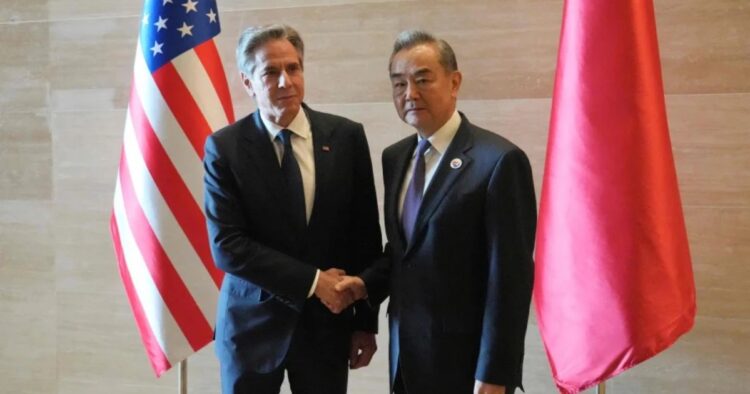On Saturday, U.S. Secretary of State Antony Blinken and Chinese Foreign Minister Wang Yi met during a regional summit held in Laos. This meeting follows a series of high-level discussions aimed at improving relations between the two major global powers.
The encounter between Blinken and Wang Yi, marked by a handshake and brief greetings in front of the cameras, was their sixth meeting since June 23, when Blinken’s visit to Beijing was seen as a significant step toward mending strained relations. Although no statements were made publicly, the closed-door discussions were anticipated to focus on critical issues between the U.S. and China.
Earlier in the day, Blinken had addressed concerns regarding China’s actions in the South China Sea, particularly in relation to the Philippines. He expressed appreciation for recent diplomatic progress, noting the successful resupply mission by the Philippines to troops stationed at the Second Thomas Shoal.
This mission, a result of an agreement between the Philippines and China, was praised by Blinken, who highlighted the importance of ongoing cooperation in the region.
The ASEAN Regional Forum in Laos also brought together diplomats from major powers, including Russia, India, Australia, Japan, and the European Union. Blinken used the occasion to emphasize the United States’ commitment to working towards a ceasefire in Gaza and achieving lasting peace and security in the region. His comments echoed those of Indonesian Foreign Minister Retno Marsudi, who stressed the urgency of sustainable peace and adherence to international law.
In his remarks, Blinken highlighted the importance of addressing the dire humanitarian situation in Gaza and finding a path to peace. His commitment to resolving the conflict underscores the U.S. dedication to diplomatic efforts in the region.
At the summit, Russian Foreign Minister Sergei Lavrov voiced concerns over U.S. nuclear operations on the Korean peninsula, indicating that the specifics of the plan were causing regional anxiety. Lavrov’s comments reflect ongoing global discussions about security measures and their implications.
ALSO READ: “Jaishankar: South China Sea Shipping Routes Crucial for Indo-Pacific Peace”
Australian Foreign Minister Penny Wong also addressed the situation in Myanmar, urging the military rulers to follow ASEAN’s peace plan and end the ongoing civil conflict. She emphasized the need for dialogue and expressed concern over the impact of the conflict on the Myanmar people.
ASEAN’s communique from the summit reinforced its support for the peace plan in Myanmar and called for a reduction in tensions in the South China Sea. The organization also expressed concern over North Korea’s missile tests and the humanitarian situation in Ukraine, emphasizing the need for peaceful resolutions and cooperation among all stakeholders.
The discussions and agreements reached at the summit reflect a shared commitment to addressing regional and global challenges through diplomacy and collaboration.

















Comments